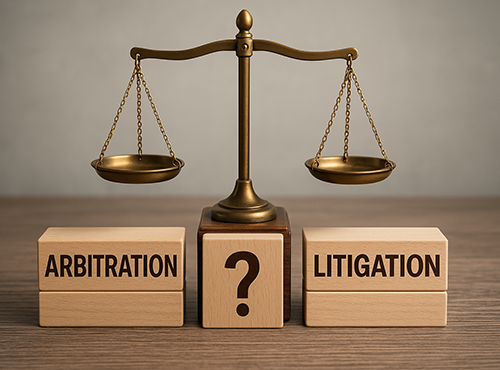Anticipatory Bail Explained: Procedure, Cost, Duration & Key Conditions in India
In criminal law, one of the most important remedies available to a person fearing arrest is anticipatory bail. Unlike regular bail, which is sought after arrest, anticipatory bail in India allows an individual to secure protection before being taken into custody. This vital legal provision is governed by Section 438 of CrPC, which empowers the High Court or Sessions Court to grant relief to a person who anticipates arrest on accusation of having committed a non-bailable offence.
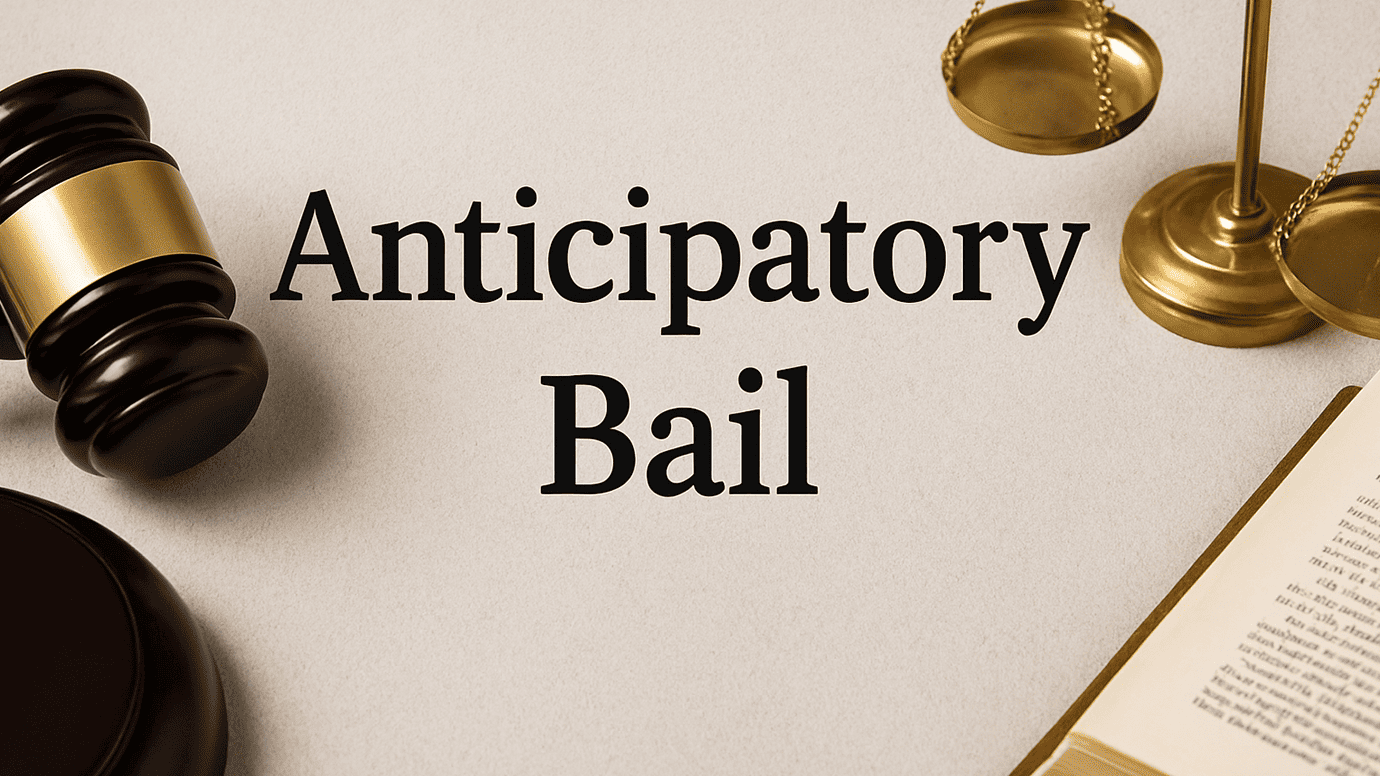
In today’s time, the significance of anticipatory bail applications has grown immensely. With the rise of false complaints, malicious FIRs, and cases of personal or business rivalry, innocent individuals are often dragged into criminal proceedings. Clients also often ask about the anticipatory bail cost, the application for anticipatory bail, the duration and validity of anticipatory bail. These are crucial factors, as the relief is not indefinite and may come with conditions such as cooperation with investigation, surrendering of passport, or restrictions on travel. A well-prepared application backed by strong legal arguments can significantly increase the chances of securing bail and avoiding custody.
In this blog, we will provide a complete guide on anticipatory bail in India, covering its meaning, importance, procedure, costs involved, and situations like matrimonial disputes or financial frauds where it is most often invoked. By the end, you will have a clear understanding of how anticipatory bail works, and why consulting an experienced lawyer is critical in such matters.
What is Anticipatory Bail?
Anticipatory bail is a legal safeguard designed to protect the liberty of individuals who fear arrest for a non-bailable offence. The concept is laid down under Section 438 of CrPC, which empowers the High Court or Sessions Court to grant bail in anticipation of arrest. In simple terms, it means that a person can approach the court before being arrested and request protection from custody.
The anticipatory bail is especially important in situations where a person is falsely implicated, or where arrest is used as a tool of harassment. For example, in many matrimonial disputes, complaints are sometimes filed under Section 498A IPC. In such cases, applying for anticipatory bail in dowry case or exploring the grounds for rejection becomes a crucial step in securing personal freedom.
It is important to distinguish anticipatory bail in India from regular bail. Regular bail comes into play after a person has been arrested, whereas anticipatory bail is preventive in nature — it ensures that the accused does not have to face unnecessary detention at all. This makes the application for anticipatory bail one of the most sought-after remedies in criminal law.
While filing, the court carefully examines factors such as the seriousness of allegations, previous criminal record, and the possibility of misuse of the law. Once granted, the validity and the duration of anticipatory bail depend on the discretion of the court, which may impose conditions like surrendering a passport, cooperating with investigation, or refraining from contacting the complainant.
Many people also inquire about the anticipatory bail cost and the overall anticipatory bail procedure. The cost usually varies depending on the complexity of the case, the jurisdiction, and the lawyer’s expertise. However, the value of liberty and avoiding the trauma of arrest far outweighs the expense.
In essence, anticipatory bail under Section 438 of CrPC serves as a shield, balancing the rights of the accused with the need for fair investigation. It protects individuals from unnecessary incarceration while ensuring that justice is not compromised.
When Can You Apply for Anticipatory Bail?
The right to apply for anticipatory bail arises when a person has a reasonable apprehension of arrest in connection with a non-bailable offence. Under Section 438 of CrPC, this protection is not available to everyone by default, but only to those who can show genuine reasons for seeking relief. The anticipatory bail ensures that personal liberty is preserved while the legal process takes its course.
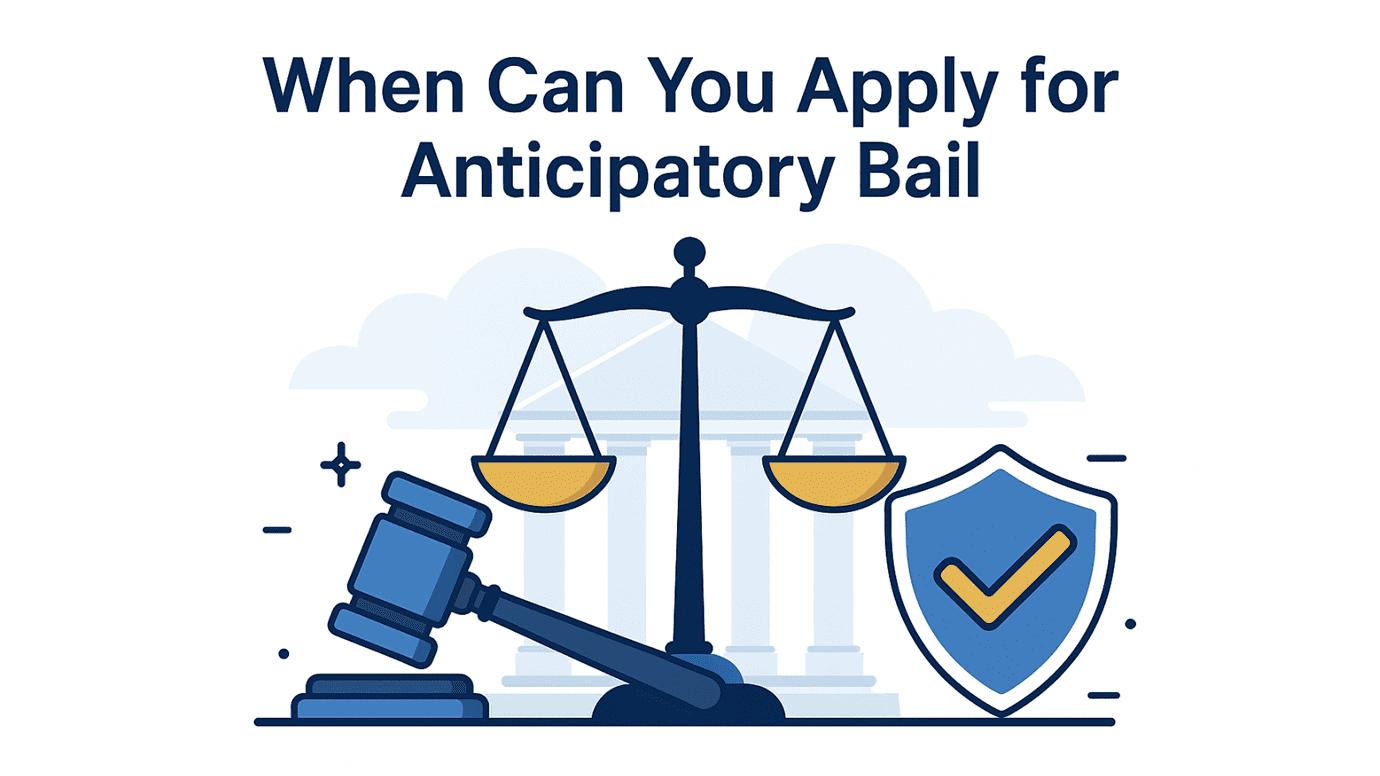
Situations Where Anticipatory Bail is Relevant
- False Accusations: Many individuals face fabricated complaints, often out of personal enmity, business rivalry, or family disputes. Filing an application for anticipatory bail at an early stage can help prevent unnecessary arrest.
- Matrimonial Disputes (498A / Dowry): A large number of petitions for anticipatory bail in dowry case or under Section 498A are filed every year. Courts often scrutinize the grounds for rejection of anticipatory bail, but genuine cases where misuse is evident are granted relief.
- Non-Bailable Offences: If someone is accused of a serious but non-bailable offence, the anticipatory bail procedure becomes crucial to safeguard liberty until the trial concludes.
- Harassment or Malicious FIRs: Sometimes, FIRs are filed merely to harass or pressure the accused. In such cases, knowing the anticipatory bail cost and approaching the right forum quickly can make all the difference.
Who Can Apply for Anticipatory Bail?
- Only the accused person (or someone apprehending arrest) can file an application for anticipatory bail.
- A complainant or informant has no right to seek this remedy.
- The court evaluates factors like the seriousness of allegations, possibility of fleeing from justice, past criminal record, and the validity of anticipatory bail once granted.
In short, anticipatory bail under Section 438 of CrPC is relevant in situations where liberty is at stake due to false or exaggerated allegations. Understanding the right time and manner to apply can help avoid the trauma of arrest and ensure fair participation in legal proceedings.
Step-by-Step Process to Apply for Anticipatory Bail in India
The anticipatory bail procedure in India is clearly defined under Section 438 of CrPC, which empowers the Sessions Court and the High Court to grant relief to individuals fearing arrest. Understanding the correct process is crucial, as even minor mistakes in the application for anticipatory bail can lead to delays or rejection. Below is a detailed, step-by-step guide to help you understand how the anticipatory bail works in practice.
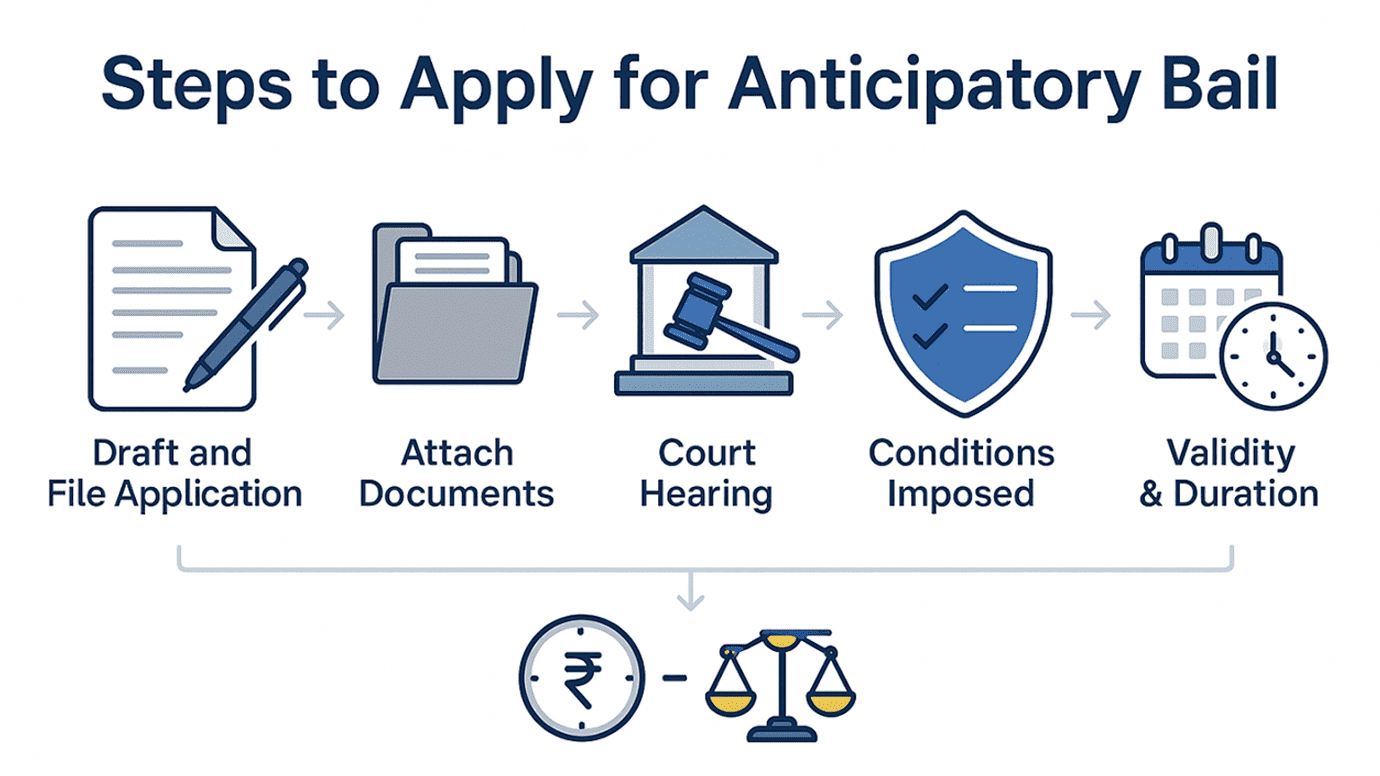
1. Drafting and Filing the Application
- The first step involves preparing a strong application for anticipatory bail that explains why the applicant fears arrest.
- This application is usually filed before the Sessions Court in the district where the FIR is lodged. In certain cases, one can directly approach the High Court.
- The application must include details such as the FIR number (if registered), nature of allegations, and reasons for seeking bail under Section 438 of CrPC.
2. Documents Required
When filing for anticipatory bail in India, the following documents are typically needed:
- Copy of the FIR (if available).
- Affidavit in support of the bail application.
- Identification documents of the accused.
- Supporting evidence to show the case is false, exaggerated, or motivated.
- In matrimonial disputes, like dowry case, supporting evidence of false implication may be very helpful.
3. Court Hearing
- Once filed, the court issues notice to the prosecution and police. Both sides present their arguments before the judge.
- The defense highlights the right to liberty, absence of criminal antecedents, and cooperation with investigation.
- The prosecution may oppose the application citing the seriousness of charges or the grounds for rejection of anticipatory bail in 498A or other sensitive matters.
- The judge then decides whether to grant relief and what conditions, if any, should be imposed.
4. Conditions Imposed by the Court
If the court grants relief, certain conditions are often attached to ensure fair investigation, such as:
- Regular appearance before the investigating officer.
- Not leaving India without prior permission.
- Surrendering passport if necessary.
- Avoiding contact with witnesses or complainants.
These conditions ensure that while the accused is protected by anticipatory bail, the investigation is not hindered.
5. Validity and Duration of Anticipatory Bail
- The validity of anticipatory bail varies depending on the facts of the case and the discretion of the court.
- Generally, the duration of anticipatory bail lasts until the completion of trial or until modified by the court.
- In sensitive matters, like dowry case, the court may grant interim relief before final orders.
6. Anticipatory Bail Cost
The anticipatory bail cost depends on factors like the court approached (Sessions vs High Court), lawyer’s expertise, and complexity of the case. While costs vary, the value of liberty and protection from arrest makes it one of the most crucial legal remedies in anticipatory bail in India.
The anticipatory bail procedure under Section 438 of CrPC ensures that individuals falsely implicated or fearing arrest are given a fair chance to defend themselves without the trauma of incarceration. A carefully prepared petition, supported by strong evidence, increases the chances of securing this vital legal relief.
Key Conditions & Limitations of Anticipatory Bail
The relief of anticipatory bail under Section 438 of CrPC is not absolute. While the anticipatory bail safeguards personal liberty, courts often impose specific conditions to balance the rights of the accused with the interests of justice. At the same time, there are clear limitations where this remedy may not apply. Understanding these aspects is critical before filing an application.
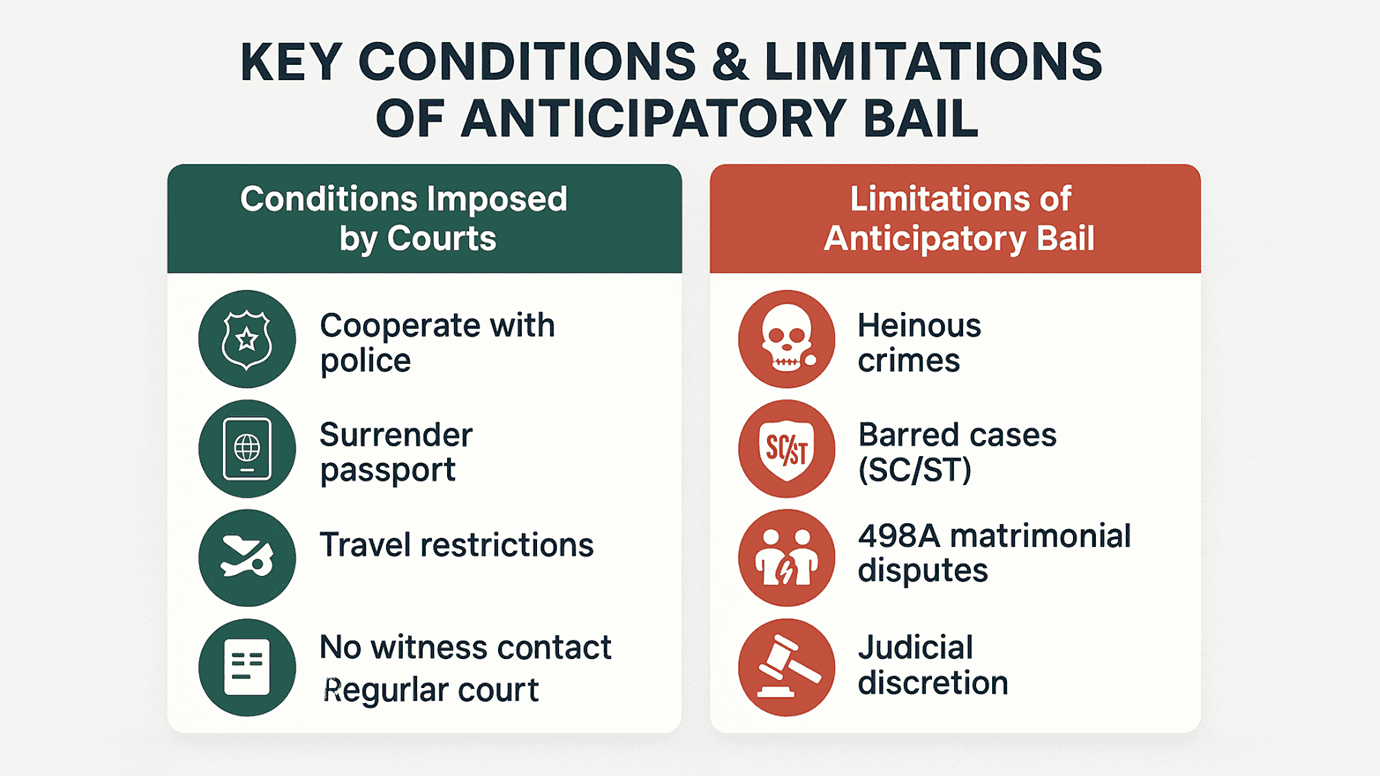
Conditions Imposed by Courts
When granting anticipatory bail in India, courts ensure that the accused does not misuse this protection. Some common conditions include:
- Cooperation with Investigation: The accused must assist police authorities, appear for questioning, and provide necessary evidence whenever required.
- Surrendering Passport: In many cases, especially those involving financial fraud or cross-border concerns, courts may ask the accused to surrender their passport. This prevents absconding.
- Restriction on Travel: The accused may be directed not to leave the jurisdiction without prior court permission.
- No Contact with Witnesses: Courts frequently order the accused not to influence or intimidate witnesses or tamper with evidence.
- Regular Appearance: The accused may have to mark attendance before the investigating officer at fixed intervals.
These conditions maintain the balance between granting liberty through anticipatory bail procedure and ensuring that justice is not compromised.
Limitations of Anticipatory Bail
While anticipatory bail in India is a powerful remedy, it cannot be claimed in every case. The law has its boundaries:
- Serious or Heinous Crimes: Courts are reluctant to grant bail for offences such as murder, rape, terrorism, or other grave charges.
- SC/ST Act Cases: In cases under the Scheduled Castes and Scheduled Tribes (Prevention of Atrocities) Act, anticipatory bail is specifically barred by law.
- 498A & Matrimonial Disputes: In cases of dowry harassment or cruelty under Section 498A IPC, courts examine the grounds for rejection of anticipatory bail in 498A If there is evidence of genuine cruelty, relief may be denied. However, where misuse is apparent, courts have often granted anticipatory bail in dowry case to prevent harassment.
- Judicial Discretion: The duration and validity of anticipatory bail are not fixed. It is entirely up to the discretion of the court, which may limit relief to a specific period or till the filing of the charge sheet.
Anticipatory Bail in Special Cases
The remedy of anticipatory bail under Section 438 of CrPC is often invoked in sensitive and high-stakes matters. While the anticipatory bail section applies broadly to non-bailable offences, its importance is most visible in matrimonial disputes, financial matters, and white-collar crimes. Below are some common scenarios where an application for anticipatory bail becomes critical.
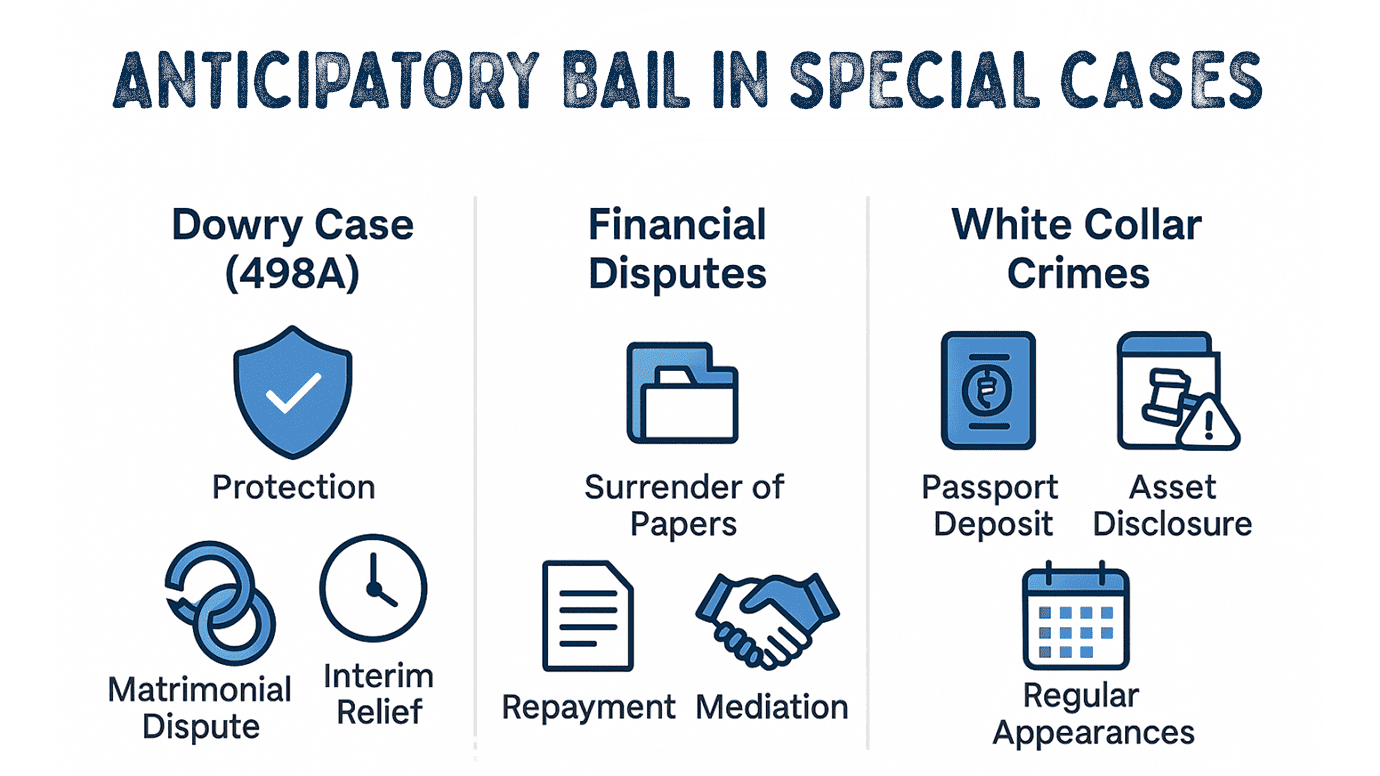
1. 498A / Dowry Harassment Cases
One of the most common situations where individuals seek anticipatory bail in dowry case is under Section 498A of the Indian Penal Code, which deals with cruelty and harassment of a wife by her husband or in-laws. Unfortunately, this provision is sometimes misused to file false or exaggerated complaints.
- In such cases, filing an early application for anticipatory bail helps prevent unnecessary arrest.
- Courts carefully assess the grounds for rejection of anticipatory bail in 498A, ensuring that genuine victims get justice while protecting innocent family members from harassment.
- The anticipatory bail procedure usually involves providing evidence of false implication, family background, and willingness to cooperate with the investigation.
The validity and duration of anticipatory bail in these cases depend on judicial discretion, though many courts grant interim protection until a full hearing.
2. Cheque Bounce and Property Disputes
In financial disputes, particularly cheque dishonour under Section 138 of the Negotiable Instruments Act, accused parties often fear immediate arrest. Similarly, in property-related cases involving fraud, forgery, or breach of trust, individuals may face custodial threats.
- Filing an application for anticipatory bail ensures the accused can contest the case without facing detention.
- Courts often impose conditions such as repayment negotiations, surrendering of documents, or cooperation with mediation.
- Although the anticipatory bail cost varies, it is a small price compared to the business disruption or reputational damage caused by an arrest.
3. White Collar Crimes
Economic offences such as fraud, forgery, cybercrime, embezzlement, and corporate scams often attract immediate police action. These cases are non-bailable and complex, making the anticipatory bail in India provision a vital tool for protecting executives, directors, and employees from custodial interrogation.
- The anticipatory bail procedure in such matters is more stringent, as courts evaluate the seriousness of allegations and financial impact on victims.
- While granting relief, judges may impose strict conditions such as depositing passports, appearing before investigating agencies regularly, or even partial asset disclosure.
- The validity of anticipatory bail in white collar cases can be limited, and courts may grant interim protection while investigating authorities gather evidence.
Whether in cases of anticipatory bail in dowry case, cheque bounce disputes, or white-collar crimes, the protective shield under Section 438 of CrPC ensures that individuals are not subjected to unnecessary detention. However, success depends on presenting a well-drafted application for anticipatory bail, backed by evidence, and understanding the limitations the court may impose.
How Long Does Anticipatory Bail Last?
One of the most common questions asked by individuals seeking anticipatory bail in India is about its duration. Since anticipatory bail is governed by Section 438 of CrPC, the law does not fix a universal timeframe. Instead, the validity depends on the court’s discretion, the seriousness of allegations, and the facts of each case.
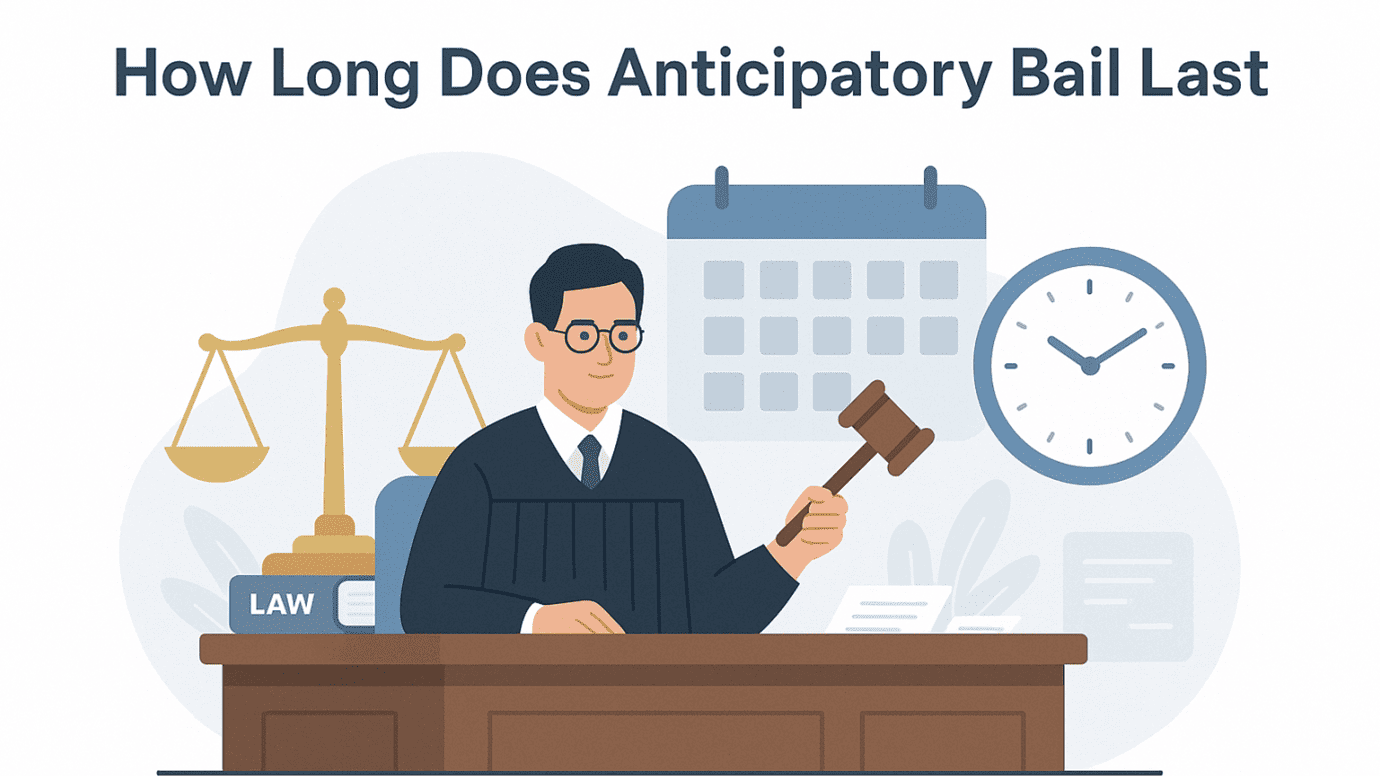
1. Duration of Anticipatory Bail
- In many cases, the duration of anticipatory bail continues until the end of the trial unless modified or cancelled by the court.
- Some courts grant interim protection at the first hearing, especially in urgent matters like anticipatory bail in dowry case or when facing false allegations under Section 498A IPC.
- Later, after hearing both sides, the court may grant permanent relief.
This flexibility in the anticipatory bail section ensures that genuine applicants are protected from arrest while also allowing the court to restrict relief in cases involving serious crimes.
2. Extension and Cancellation
- The court has the power to extend or modify the relief depending on the circumstances.
- If the accused misuses the liberty, tampers with evidence, or violates the conditions imposed, the prosecution can file for cancellation.
- For instance, the grounds for rejection of anticipatory bail in 498A often include failure to cooperate with investigation or threats made to the complainant.
- Similarly, in white-collar or financial offences, bail may be limited in time until the anticipatory bail procedure is fully heard.
3. Judicial Approach
The Supreme Court has clarified that anticipatory bail under Section 438 of CrPC should not ordinarily be time-bound, except in rare cases where limiting the validity of anticipatory bail is necessary for justice. However, lower courts may sometimes grant protection for a fixed period, requiring the accused to seek regular bail later.
4. Practical Considerations
Applicants should also consider the anticipatory bail cost since repeated hearings for extension may increase expenses. Therefore, filing a well-prepared application for anticipatory bail with strong legal grounds at the initial stage is always advisable.
The duration of anticipatory bail is not rigid. It may last until the conclusion of the trial or until the court decides otherwise. Ultimately, the protection depends on compliance with conditions, seriousness of allegations, and judicial discretion. For anyone facing false accusations—whether in financial matters or in dowry case—understanding the timeframe and possible cancellation grounds is vital.
Common Myths vs Reality of Anticipatory Bail
The concept of anticipatory bail under Section 438 of CrPC is often misunderstood by the general public. While the anticipatory bail is a crucial safeguard against arbitrary arrest, several myths surround it. Believing these misconceptions can create false expectations and legal complications. Let’s separate the myths from the reality.
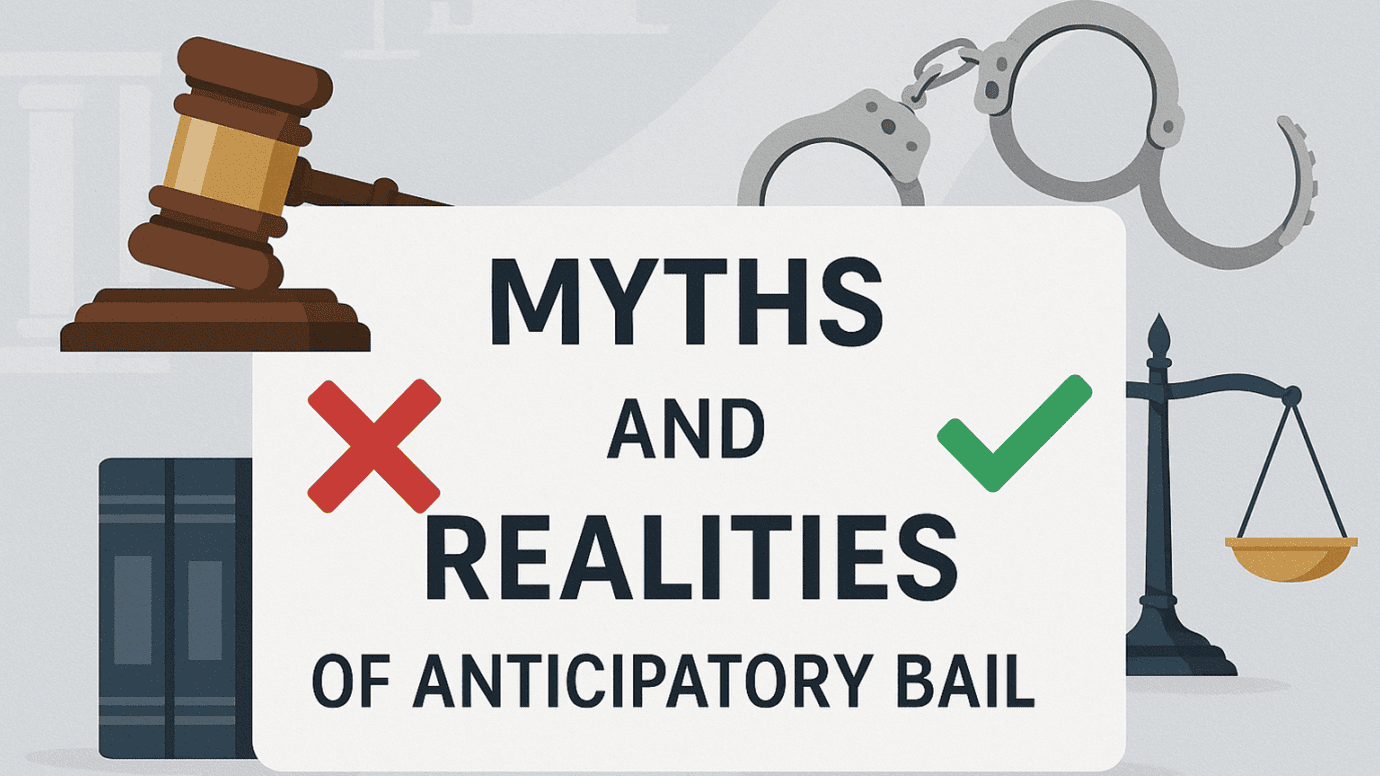
Myth 1: Anticipatory Bail is Permanent Bail
Reality: Many people believe that once an application for anticipatory bail is granted, it permanently protects the accused from arrest. In truth, the duration and validity of anticipatory bail depend entirely on judicial discretion. Courts may grant it until the completion of trial, or limit it to a certain period, after which the accused must seek regular bail.
Myth 2: Anticipatory Bail Guarantees Acquittal
Reality: Another common misconception is that obtaining anticipatory bail in India automatically proves innocence and guarantees acquittal. This is not true. It only ensures that an individual is not taken into custody during the trial process. It does not influence the final judgment, which depends on evidence and legal arguments.
Myth 3: Anticipatory Bail Cannot Be Cancelled
Reality: Courts have the authority to cancel or modify bail if conditions are violated. For example, in anticipatory bail in dowry case or 498A cases, if the accused intimidates the complainant or interferes with the investigation, the court may revoke bail. In fact, the grounds for rejection of anticipatory bail in 498A often include such violations, highlighting that bail is a conditional relief, not an unconditional right.
Myth 4: Anticipatory Bail is Very Expensive
Reality: While people worry about the anticipatory bail cost, the expense varies based on the complexity of the case, the lawyer’s expertise, and whether the matter is in Sessions Court or High Court. In most cases, the cost is significantly lower than the personal and professional damage caused by an arrest.
Myth 5: Anyone Can Apply for Anticipatory Bail
Reality: Only the accused who apprehends arrest can move an application for anticipatory bail. Complainants, relatives, or third parties cannot use this remedy. Moreover, it is not available in every case, as courts carefully assess factors like seriousness of the offence and misuse of law.
The truth is that anticipatory bail in India is a protective measure, not a blanket immunity. It does not prove innocence, nor does it guarantee acquittal. Instead, it provides temporary relief from arrest, subject to compliance with conditions imposed by the court. A well-prepared application for anticipatory bail with legal expertise ensures better chances of success while avoiding the risks of cancellation.
Why You Need a Lawyer for Anticipatory Bail
Filing for anticipatory bail is not just a legal formality—it is often the difference between liberty and arrest. While Section 438 of CrPC provides the legal framework, the outcome depends heavily on how the application for anticipatory bail is drafted and argued in court. This is why engaging an experienced lawyer is crucial when dealing with the anticipatory bail procedure.
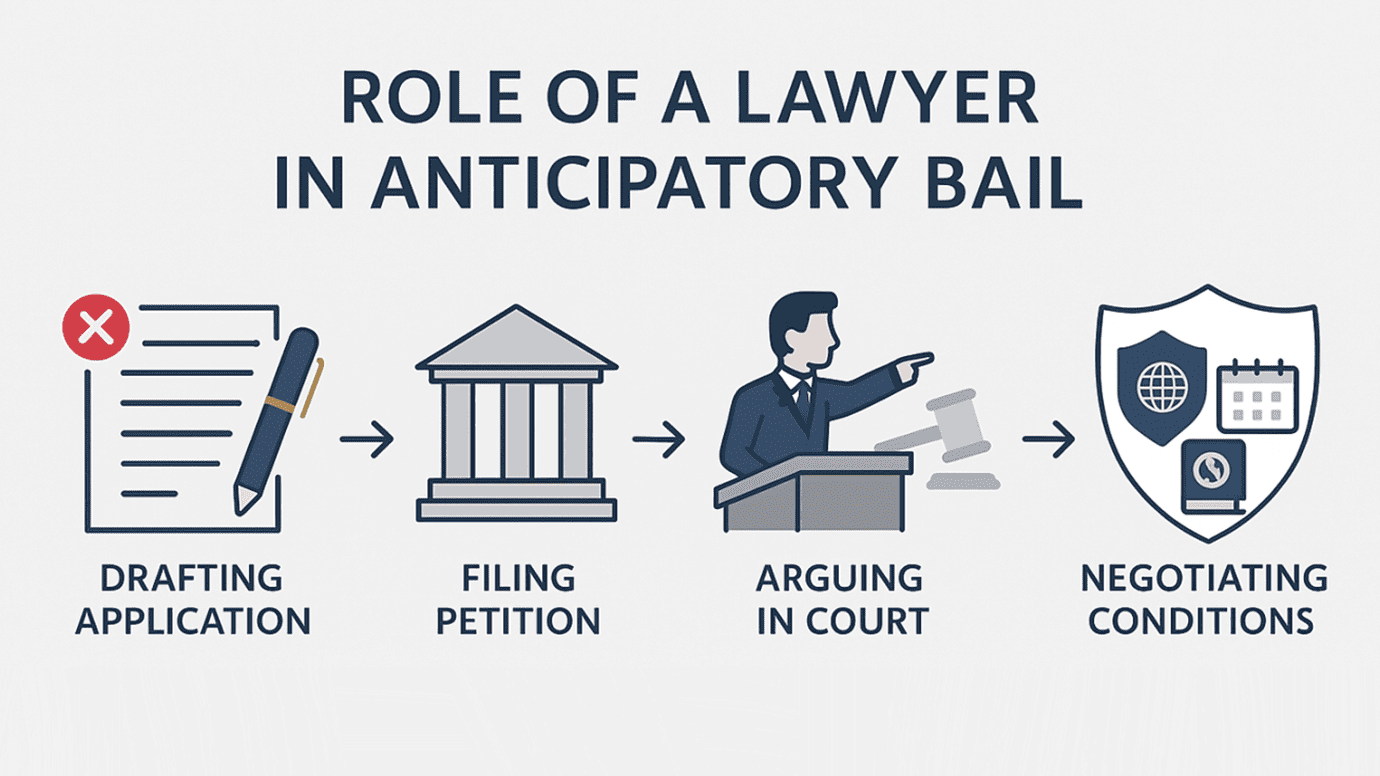
1. Drafting a Strong Bail Application
The first step in securing anticipatory bail in India is submitting a well-prepared petition before the Sessions Court or High Court. A skilled lawyer ensures that the application for anticipatory bail highlights:
- The false or exaggerated nature of allegations.
- The absence of criminal history.
- Willingness to cooperate with investigation.
- Constitutional rights under personal liberty.
In sensitive matters like anticipatory bail in dowry case, the drafting must carefully address the misuse of Section 498A IPC while balancing the seriousness of the charges. Poorly drafted petitions often lead to rejection, especially if they fail to counter the grounds for rejection of anticipatory bail in 498A.
2. Expertise in Handling Court Arguments
Once the petition is filed, the next stage of the anticipatory bail procedure involves court hearings. Lawyers play a vital role here by:
- Presenting persuasive arguments before judges.
- Countering prosecution claims.
- Citing relevant precedents and judgments that interpret Section 438 of CrPC.
- Negotiating reasonable conditions such as surrendering a passport or regular attendance instead of custodial interrogation.
Without professional expertise, applicants risk unfavorable conditions, delays, or outright rejection.
FAQs
A1. Anticipatory bail under Section 438 of CrPC is a legal remedy that allows a person to seek bail in anticipation of arrest for a non-bailable offence. It ensures that an accused can avoid unnecessary custody while cooperating with the investigation.
A2. An application for anticipatory bail should be filed when an individual reasonably fears arrest due to false complaints, non-bailable offences, or disputes such as dowry harassment cases. Filing early ensures that the court can provide protection before custody.
A3. Regular bail is applied for after arrest, while anticipatory bail in India is preventive and sought before arrest. The anticipatory bail section provides relief in advance, safeguarding liberty from the outset. For more information, read our dedicated blog on Bail laws in India.
A4. The anticipatory bail procedure requires documents like a copy of the FIR (if available), an affidavit supporting the petition, identity proofs, and any evidence showing false implication. These strengthen the case before the Sessions Court or High Court.
A5. The anticipatory bail cost varies depending on factors like the seriousness of allegations, the court approached, and the lawyer’s expertise. While there is no fixed fee, the expense is minor compared to the impact of an arrest on one’s life and reputation.
A6. The validity of anticipatory bail is not uniform. In many cases, it lasts until the end of the trial, while in others, courts may restrict it to a specific period. Judges decide the duration of anticipatory bail based on the facts and circumstances of the case.
A7. Yes, anticipatory bail can be cancelled if conditions are violated. For example, in anticipatory bail in dowry case or matrimonial disputes, harassment of the complainant or non-cooperation with investigation may lead to cancellation.
A8. The grounds for rejection of anticipatory bail in 498A include credible evidence of cruelty, threats to the complainant, or attempts to obstruct justice. Courts balance protecting the innocent with safeguarding genuine victims.
Conclusion
The remedy of anticipatory bail is one of the most powerful protections available under Indian criminal law. Enshrined in Section 438 of CrPC, the anticipatory bail empowers courts to safeguard an individual’s liberty against false or exaggerated allegations. Unlike regular bail, it acts as a preventive measure, ensuring that a person is not unnecessarily subjected to arrest and custody.
Throughout this guide, we have discussed the importance of filing a strong application for anticipatory bail, understanding the procedure, and knowing the conditions and limitations attached to it. From matrimonial disputes, such as anticipatory bail in dowry case, to financial matters and white-collar crimes, this legal tool has proven essential in protecting the rights of individuals facing harassment.
It is important to remember that the validity and the duration of anticipatory bail depend on the facts of each case and the discretion of the court. Relief is not automatic, as judges also evaluate the grounds for rejection of anticipatory bail in 498A and other offences where misuse of the law is alleged. This makes expert legal guidance invaluable.
While the anticipatory bail cost may vary depending on the complexity of the case and the court approached, the value of safeguarding personal freedom and dignity far outweighs the expense. In fact, timely action and proper representation can prevent unnecessary trauma, reputational damage, and prolonged legal battles.
In conclusion, anticipatory bail in India strikes a balance between protecting innocent citizens and ensuring fair investigation. If you are facing false allegations or fear arrest, do not delay—consulting an experienced lawyer can make all the difference in securing your rights under Section 438 of CrPC. A carefully drafted petition, professional advocacy, and compliance with court conditions will give you the strongest chance of success in the bail process. For more information regarding different case scenarios, go to our Homepage.
Disclaimer:
This blog is intended for educational and informational purposes only. It should not be taken as legal advice or relied upon as such. Cases of Anticipatory Bail are sensitive and often vary based on individual circumstances, which may affect the legal remedies available.
If you or someone you know is facing such challenges, it is advisable to seek guidance from a qualified lawyer or legal professional. For safe and confidential support, you may also consider reaching out to trusted legal platforms such as Adlegal.


